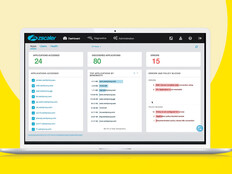“We had nine different versions of Office floating around the organization. That was a problem from a security standpoint,” since support for the county’s older Office versions ended long ago, “and it was a problem when it came to compatibility for different users to share files with each other,” Collins says.
The county considered the options and ultimately decided the best solution was to move the entire county to Microsoft Office 365. Critically, the cloud-based suite of apps from Microsoft could be accessed from any device, so county employees could communicate and use the tools even when they weren’t in a government building. It also brought the agency up to speed with the state of Michigan, which was already using Office 365.
“The county courts in particular do a lot of sharing of documents with the state,” Collins says. “Now we’re completely in sync, so it just makes everything much more manageable.”
MORE FROM STATETECH: What are some of the top anti-phishing best practices for state and local governments?
Pasco County Needed an Email Archiving Solution
The need for reliable message storage and retrieval capabilities led Florida’s Pasco County to a Mimecast solution that archives emails in the cloud, says Pasco County CIO Todd Bayley.
Unlike Cass County, Pasco County decided to stick with its on-premises email system — it uses Microsoft Exchange with Office 365 ProPlus — and rely on Mimecast as a cloud-based partner to sandbox incoming messages and cache those going out, Bayley says.
The county IT department is required to archive emails because of a Florida statute known as the “Sunshine Law,” which guarantees timely public access to government records, Bayley says. The county considered an in-house solution but that approach was cost-prohibitive.
Pasco County needed an archiving tool that would automate the process so workers could fulfill records requests as quickly as possible. And the solution had to be scalable — ready to expand with the county’s growing needs. “A cloud-based service made the most sense,” Bayley notes. “And email archiving is Mimecast’s core competency.”
As for the sandboxing, the company only started offering the service after Pasco County was already a customer. Up to that point, Bayley’s team struggled to keep up with bad actors, although the county had not succumbed to an attack. Bayley knew the county’s luck couldn’t last forever, “so we jumped on that solution immediately,” he says.
Now, the county has reliable threat protection across the email accounts of its 2,700 employees. “All URLs in the body of an email and in attachments are checked before they make it to your inbox,” Bayley says. “If the system detects anything that could be malicious, we get a notification that it needs to be reviewed.”
The county will remain proactive as it trains employees to recognize potential threats.
“Honestly, that's all we can do. We use the tools available and try to think ahead and raise awareness as much as we can,” Bayley says.












